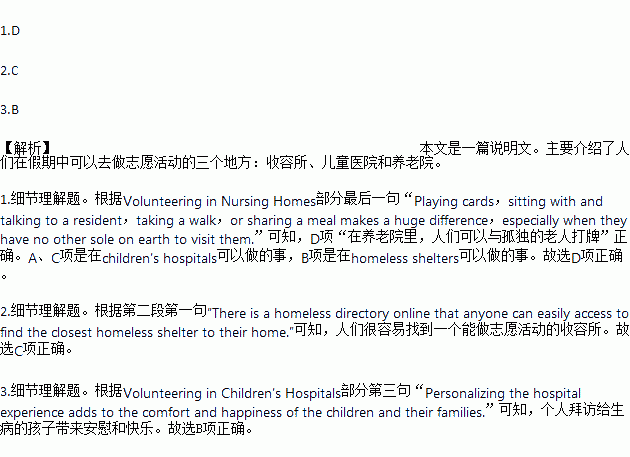题目内容
For many people,volunteering is a way of life. Holidays are the time of the year that more people are in a giving mood. Homeless shelters,children’s hospitals,and nursing homes are excellent places to give of one’s time.
Volunteering in Homeless Shelters
There is a homeless directory online that anyone can easily access to find the closest homeless shelter to their home. According to the homeless shelter directory,currently there are 3,233 shelters in the US,so it is not difficult to find a shelter. Helping to serve food,picking up donations of food,preparing meals,and cleaning up are things that one can do to help at a homeless shelter.
Volunteering in Children’s Hospitals
Every child needs comfort and joy,especially during the holiday seasons. By visiting sick children in hospitals,an individual provides helping hands by supplementing the services usually done by the hospital staff. Personalizing the hospital experience adds to the comfort and happiness of the children and their families. Volunteers provide help,and positive interactions (相互交流) which enhance the patient’s quality of care. Help is needed almost everywhere in a hospital;from the lobby,parking lot,cafeteria,to admitting,helping with the gift cart,and even reading to children in the waiting rooms or their hospital rooms.
Volunteering in Nursing Homes
According to the National Center for Health Statistics,“Over 50% of those living in nursing homes do not have close relatives and 46% have no living children.” Life in a nursing home is lonely,confusing,and frightening for many residents. Volunteering at a nursing home is a great opportunity to make a difference in someone else’s life. Playing cards,sitting with and talking to a resident,taking a walk,or sharing a meal makes a huge difference,especially when they have no other sole on earth to visit them.
The three examples above are only a small fraction of institutions in which volunteers are needed. Giving of oneself,especially during the holidays blesses and cheers others.
1.According to the passage,what can a volunteer do in nursing homes?
A. Visiting the sick children.
B. Picking up the donated food.
C. Helping with the gift cart.
D. Playing cards with a lonely old man.
2.What can we learn about the volunteering?
A. You can only volunteer during the holidays.
B. You can help prepare meals in a nursing home.
C. It is easy to find a homeless shelter to volunteer.
D. Help is needed everywhere in a homeless shelter.
3.In a children’s hospital,which of the following is true?
A. Over 50% of those living there do not have relatives.
B. A personal visit brings happiness to a sick boy.
C. Children live a lonely and frightening life.
D. Children love listening to volunteers’ reading.
 应用题作业本系列答案
应用题作业本系列答案


 f our lives, we’ll have our trust tested or violated.
f our lives, we’ll have our trust tested or violated.